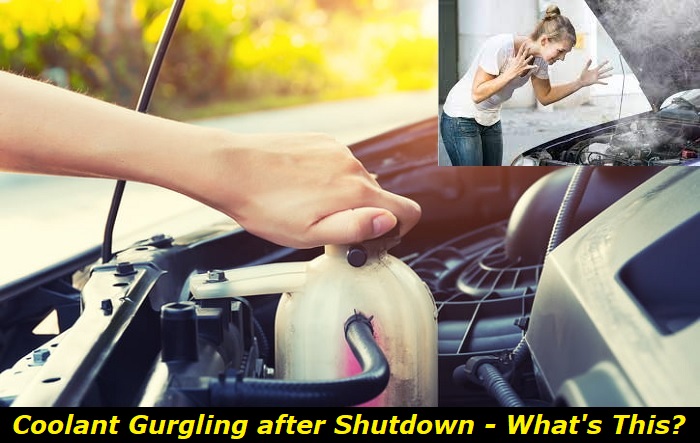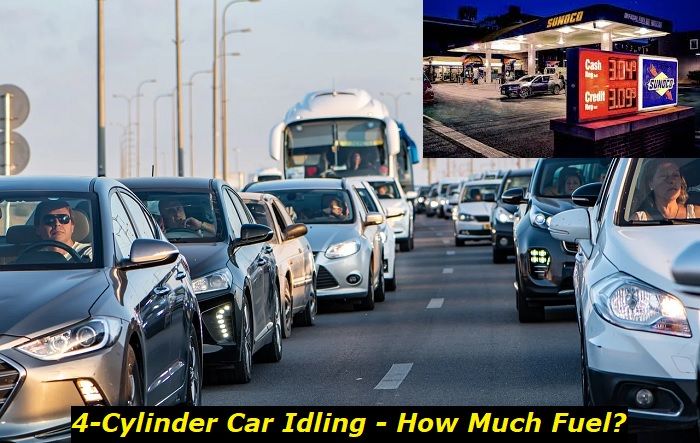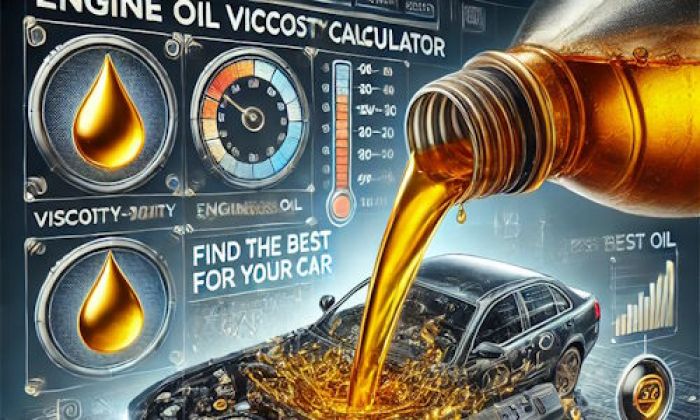You are driving home, and your vehicle is all fine. When you arrive and park, you hear something like a gurgling or bubbling liquid. Like many other car owners, you will freak out, thinking something is wrong with your vehicle. While it could be a severe issue, it could also be nothing-just the regular operation of your engine coolant.
Cooling system problems highlights
- Level of urgency: high
- Common reasons: bad antifreeze, broken cooling equipment, leaks
- DIY diagnostics: very complicated
- DIY repair: impossible
- Price of repair: $250 - $650
- Time for repair: 3 – 8 hours
- If ignored: engine overheating and failure

Why the Gurgling Sound
The gurgling sound of the coolant only means there is fluid in operation. This is common, mostly in vehicles with expansion tanks attached to radiators. This setup works differently. In ordinary radiator design, the coolant is usually locked inside the radiator with nowhere to escape when it heats up and expands.
In vehicles with radiator expansion tanks, engineers considered that heated liquid needs space for expansion. Your vehicle has hoses connecting the expansion tank to the radiator. When the coolant heats, it spills into the expansion tank. When it cools down, the spilled coolant flows back into the radiator. The two processes could cause the gurgling sound and are normal.
However, you cannot rule out the possibility of a problem entirely. Sometimes, the coolant could have air trapped in the radiator. As coolant moves in the system, the air moves in a bubble form, producing a gurgling sound. This can be an issue worth worrying about. When the coolant traps air in the system, it causes your engine to overheat.
Keep reading to learn more about the gurgling coolant and ways to deal with it.
Why Does My Coolant Gurgle When I Shut the Engine?
Anything that causes the engine to overheat is a potential reason your coolant is gurgling when you switch off the vehicle.
1) Faulty Head Gasket
The head gasket seals the combustion chamber to maintain proper compression for complete fuel combustion. It also plays a vital role in keeping harmful emissions from escaping the combustion chamber. A suitable head gasket ensures your vehicle keeps delivering enough power for your vehicle's optimal performance.
Moreover, the head gasket is also responsible for ensuring your engine coolant does not leak.
How Does a Faulty Head Gasket Affect Engine Coolant?
When the head gasket fails, it causes the engine to overheat. In this state, the engine has to overwork to compensate for the lost performance. The faulty head gasket also allows fuel, air, and coolant to mix. As the temperature in the engine rises due to overheating, it heats the engine coolant, which begins to boil when it reaches its boiling point.
You will not notice the boiling noise when driving due to other noises around you. However, when you arrive and kill the engine, you will hear the gurgling noise from the coolant reservoir. Check if your cooling lamp is glowing. Also, climb down the vehicle and check under the bonnet, a white smoke confirms your doubts about a damaged head gasket.
2) Air Pockets in the Coolant System
Several factors could allow air into the coolant system, which creates the bubbling phenomenon in the reservoir or radiator.
A lousy coolant service job is another reason there are air bubbles in your fluid reservoir. When you take your vehicle for service, ensure an expert is working on it. An armature will not bleed the coolant system properly.
As you drive, the vehicle heats up, forcing air bubbles in the coolant system to expand and enter the coolant reservoir. When you stop your car, and it starts to cool down, the expanded air bubbles contract, leaving empty spaces within the system. You hear the gurgling sound because the system is sucking fluid from the reservoir to replace the air. Although this will not hurt your vehicle, you can avoid it by choosing an expert to flush and refill your coolant system.
Mechanics have many options for bleeding the coolant system, such as bleeder valves at the coolant lines. In addition, the mechanic can use a unique vacuum coolant filler, an exceptional tool that prevents air from going into the coolant system. This tool also pulls out air bubbles already in the coolant system.
3) Radiator Problems
Several problems can arise around the radiator. First, dirt and debris entering the radiator can clog it, making it hard for the coolant fluid to flow. When your radiator blocks, it causes the engine to overheat, and as mentioned earlier, this increases the coolant temperature until it boils.
Another potential problem with the radiator is a failed cap. Many mechanics overlook this area when servicing your coolant system. The radiator cap is like a release valve that functions automatically. When the coolant fluid reaches maximum temperature, this release valve opens up and ensures the cooling system maintains the required pressure.
When the radiator cap fails, several things can happen, the primary issue being that the system cannot maintain the required pressure. Another problem is that with a failed radiator cap, the system can draw air into the coolant reservoir. You will hear gurgling when you switch off the car as the coolant cools.
4) Faulty Thermostat
The primary function of the thermostat is to regulate the flow of coolant fluid in and out of the radiator. It must open and close precisely for the radiator to function correctly. The thermostat should open to allow hot coolant from the engine into the radiator and vice versa. If this component fails, it interrupts the flow of the coolant, causing it to bubble in the reservoir or radiator.
5) Faulty Cooling Fan
As the coolant helps your engine stay cool during operation, it becomes extremely hot, even when nothing is at fault. The cooling fan works with the coolant to enhance the cooling effect of the engine. When you stop the engine, the cooling fan helps to cool down the fluid. If everything in the cooling system is working correctly, there will not be any bubbling noise as the cooling effect works normally.
However, when the cooling fan fails, the excess temperature produced by the engine and other components under your bonnet will cause the coolant to boil. Thus the gurgling sound. The cooling fan can be faulty because of a damaged fuse, corroded wires, or a defective clutch.
Although it does help the coolant to cool the engine as you drive, the primary function of the cooling fan is to cool the coolant down when you stop the engine. If it fails, the coolant will take longer to cool.
What to Do When You Hear Your Coolant Gurgling
It is essential to follow up on any strange behavior in your vehicle. Such behaviors include the gurgling noise from the engine coolant. Ensure you take your car for inspection as soon as possible to avoid future extensive and expensive repair work. You should drive to a professional mechanic to diagnose your vehicle and root out the cause of the issue.
Your Mechanic Will Perform One of the Following Fixes:
- Remove Air Pockets from the System
Do not leave any air trapped in the radiator or reservoir when flushing the coolant system. If you flush the system yourself, you should allow your vehicle to run for at least 15 minutes with the radiator cap open after refilling the system. This will remove any air trapped in the system before replacing the cap.
- Fix the Bad Head Gasket
If the head gasket in your car is faulty and leaking, it allows combustion gases to enter the cooling system. You must fix the leak to avoid overheating and gurgling the coolant fluid. Although you can fix this in your home garage, involving a professional mechanic for expert advice is crucial. An expert will know whether to replace the bad head gasket or repair the existing one.
- Replace the Malfunctioning Thermostat
A bad thermostat interrupts the proper flow of the coolant, causing it to overheat and boil. The only lasting solution to this issue is to replace the faulty thermostat with an original one or a compatible aftermarket thermostat.
Other possible fixes include the following:
- Replacing or fixing the radiator cap
- Replacing or sealing leaky radiator hoses
- Replacing or repairing the heater control valve
- Replacing the faulty water pump
- Flush the coolant reservoir and radiator regularly
In Conclusion
Gurgling coolant could mean you have faulty components in the cooling system. It could also be nothing worth worrying about. Nevertheless, would you know for sure unless you diagnose the cooling system?
The coolant could be boiling in the reservoir after you shut the car because the engine is still hot, and the coolant is cooling down. Your mechanic can leave air trapped in the system after flushing and refilling it. This is also another possible cause of the gurgling coolant.
Although these issues should not worry you, the gurgling could be because some cooling system components are faulty, causing the coolant to overheat and boil. The best way to be sure is to visit a professional mechanic or check the causes we mentioned earlier.
It is vital to fix the cause of the gurgling coolant before it becomes a severe problem.
About the authors
The CarAraC research team is composed of seasoned auto mechanics and automotive industry professionals, including individuals with advanced degrees and certifications in their field. Our team members boast prestigious credentials, reflecting their extensive knowledge and skills. These qualifications include: IMI: Institute of the Motor Industry, ASE-Certified Master Automobile Technicians; Coventry University, Graduate of MA in Automotive Journalism; Politecnico di Torino, Italy, MS Automotive Engineering; Ss. Cyril and Methodius University in Skopje, Mechanical University in Skopje; TOC Automotive College; DHA Suffa University, Department of Mechanical Engineering






Add comment